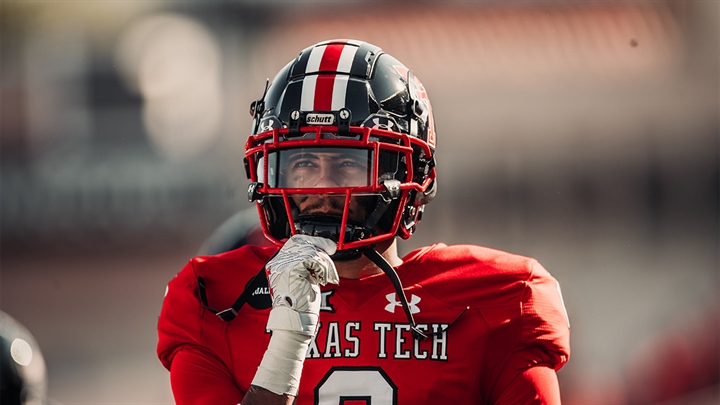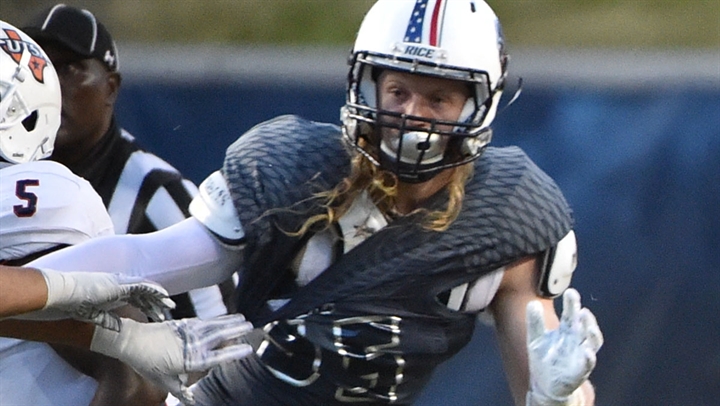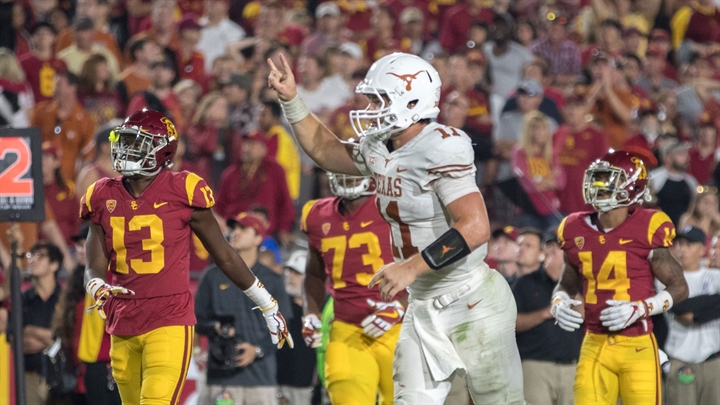Days before the fall 2020 football season got underway, the NCAA dropped a bombshell. To quell all concerns about eligibility during the COVID-19 pandemic, the Board of Directors decided to grant a blanket eligibility waiver for every fall sport athlete.
Without knowing it, the NCAA was rolling the dice and creating three Community-esque timelines for the more than 10,000 players in college football. Suddenly, for the first time, every player had choices.
Players had the right to come back to their programs as “super seniors” and use a fifth full year of eligibility. With this extra eligibility, they could graduate and transfer to a new destination for a second chance. They could also forego their extra year and try their hand at professional football – or give up the sport altogether.
Texas Football spoke to several college football players from across Texas college football who faced this life-changing decision.
Here is how they made it.
‘I haven’t finished what I’ve started’
Few players know college football quite like Texas Tech’s Seth Collins. The West Coast native had an entire first act of playing quarterback and receiver at Oregon State before joining Kliff Kingsbury’s Texas Tech as a wide receiver.
But thanks to injuries and coaching changes, we haven’t seen the best of Collins in Lubbock as yet. With the NCAA granting Collins an almost unmatched seventh year of eligibility, he wants to get it right.
“I haven’t finished what I’ve started,” Collins said. “I want to go out of college football with a bang. I want to show I’m still that guy that can play at a high level.”
After five years of primarily playing wide receiver, the 24-year-old decided it was time to try something new. Before the 2020 season, Collins asked the coaching staff about switching positions from receiver to free safety. Collins hasn’t played defense at the college level, but backpedaling and triggering felt more natural than constant stop-and-go on his older knees.

Red Raiders defensive coordinator Keith Patterson has developed defensive backs at a high level, but Collins didn’t have the benefit of camp to learn the position because of the pandemic. Ultimately, he suffered another season-ending shoulder injury.
“If I was still on the offensive side of the ball, maybe I would have gone to the NFL,” Collins said. “I already have a lot of film from Oregon State. Making the switch, I don’t have film at safety.”
Perhaps just as importantly, Collins is excited about the prospect of getting a masters degree. He’s just two semesters shy of earning his masters in interdisciplinary studies from Texas Tech. Even if professional football doesn’t work out, the prospect of entering the job market with multiple degrees from a major university was too good to pass up.
More than 80 Texas FBS players have committed to returning to their programs in 2021, including a Big 12 leading 10 at Texas Tech. Notable returners include Baylor cornerback Raleigh Texada, Texas A&M DL Jayden Peevy and SMU offensive lineman Hayden Howerton. Texas State leads all Texas programs with 12 super seniors.
“This last year… I mean I won’t say it was the worst, there were a lot of great things that came out of 2020,” Collins said. “But who doesn’t want to play in front of a crowd and have a full season? I wanted to go to a bowl game. I want to experience that.”
‘It’s got to be the right situation’
When Rice linebacker Blaze Alldredge heard that he would get a real senior year, he was relieved.
“Especially at Rice, we had the late start and it was looking for a long time that we weren’t going to have a season at all,” Alldredge said. “It put my mind at ease that in a worst-case scenario, I could come back.”
The plan was simple. If Rice played, he would leave for the NFL Draft, participate at the NFL Combine, perform well at Pro Day. If the pandemic cancelled the Owls’ season, he would simply come back and put together an All-Texas College caliber season to raise his draft stock for 2022.
For a while, it looked like Rice wouldn’t play. Finally in October, the Owls opened camp for an Oct. 24 start, but played only two games before another layoff. Then it was one more game before another cancellation. Ironically, Rice’s only back-to-back games were rescheduled December matchups.
“It was tough, really stressful,” Alldredge said. “It was hard in the moment to appreciate what Rice was doing for us. Looking back, we were probably the safest school in the country when it came to COVID. Just how it affected my athletic career upset me a little bit.”
There’s no question, Alldredge was an exceptional player at Rice. He was a selection to the Texas Football All-Texas College preseason team after an astonishing 102 tackles, 21.5 tackles for loss and four sacks in a breakout junior season. Leaving after playing five games – five outstanding games, but five nonetheless – would have Alldredge at his lowest value.

Alldredge knows he is good enough to play on Sundays, and also that poor draft position could cost him a great deal of money. Getting a masters degree helped make the decision to return easier.
“I really started to think about grad transferring because I’d had a good couple years,” Alldredge said. “With the NFL being my main goal, I felt that going up to a bigger school could help me with that.”
The process was almost instantaneous. WIthin hours, Alldredge had a dozen teams in his DMs. For the one-time zero-star JUCO prospect, getting an SEC offer was the real deal.
Missouri was one of the first three teams to reach out to Alldredge. The Tigers put together a .500 season in Eli Drinkwitz’s first SEC-only campaign. It didn’t hurt that the program developed former Frisco Lone Star standout LB Nick Bolton into an All-American. He’ll also get to learn from LBs coach D.J. Smith, a 32-year-old former NFL linebacker who just went through the same process Alldredge dreams about.
“As a grad transfer with an extra year, it’s really something that I’ve got to make count, it’s got to be the right situation,” Alldredge said. “SEC, it doesn’t get any better than that.”
Alldredge is not the only Texas college star to turn his eyes elsewhere. Baylor quarterback Charlie Brewer (Utah), TCU OL T.J. Storment (Texas Tech), Texas RB Keaontay Ingram (USC) and North Texas DB Cameron Johnson (UCLA) rank among those seeking to maximize their senior seasons.
But perhaps the most fascinating transfers in the country come from the Texas small college ranks. Houston Baptist quarterback Bailey Zappe – the most underrated quarterback in America – is following his offensive coordinator Zach Kittley to Western Kentucky. Receivers Ben Ratzlaff, Josh Sterns and Jerreth Sterns are heading to Kentucky with him.
“I never really got that chance to accomplish a lot of things that I felt like we could have in terms of winning, going to a bowl game,” Alldredge said. “I definitely felt like I had unfinished business in college football...I think [transferring] gives me every possible tool to take my future into my own hands. I’m excited for that.”
‘Four years...is a long time’
Despite the opportunity to return, a number of athletes decided to let their eligibility expire and enter the next phase of their life.
Texas quarterback Sam Ehlinger had the chance to become the first five-year starter and leave the program as the leader in every statistical category. He also graduated in December. After talking to his inner circle, he decided the stars were aligning to move on.
“Four years starting at the University of Texas is a long time,” Ehlinger said. “It may have been one thing if I had maybe redshirted my freshman year and only played three years, but four years of playing college football is a long cycle.”
At Texas A&M, seven seniors decided to capitalize on the Aggies’ Orange Bowl title run and entered the NFL Draft, including starting QB Kellen Mond. TCU LB Garret Wallow, Texas Tech DB Zech McPhearson and SMU QB Shane Buechele also rank among those ready for the next step in their football careers.
Across the state in El Paso, UTEP linebacker Stephen Forester made a different decision. Without a path to professional football, Forester made the decision to explore the next chapter of his life.
“My main thing was just that I was in college football for too long,” said the 24-year-old Forester. “I need to get out and make some money.”
Like virtually every other Division I football player, Forester entered UTEP with dreams of playing in the NFL. After grayshirting and an injury-plagued start to his career, Forester stepped into a starting role as a junior and proved to be a standout senior. He would have been a surefire starter in 2021.
When the COVID-19 pandemic hit, it changed things. The city of El Paso was hit as hard by the virus as anywhere in the world. It put life into perspective, and made Forester reassess. Gone was the structure of football. But with it came the freedom for Forester to begin the difficult process of finding his new dream.
“It’s really tough – I’ve played football since I was real little,” Forester said. “I haven’t had many thoughts other than that’s been my Plan A. It’s a tough transition. It’s something that definitely took time and took self-evaluation and realization that I am a lot less sure of what the future looks like than what I thought it was.”
But during the pandemic, something happened that put everything into perspective. His uncle, Steve Clarke, was diagnosed with brain cancer. Without the obligations of football holding him back, Forester decided he was going to do something about it.
On May 8, Forester will bike the 650 miles from El Paso to Dallas in a fundraising event he has named “Bike to Crush Cancer.” Proceeds will go to multiple charities that are working to find a cure for brain cancer.
Forester majored in finance and was fascinated by the confounding movement of the market over the past few months. He hopes to eventually land in the field. But for these moments, freeing himself of his obligations and being able to fully be there for his family has nourished him as he moves to private life.
“There’s a lot of things that happened when I was at UTEP within my family that was like, something has gone on but I can’t go and help because I’ve got these other responsibilities,” Forester said. “When you actually help out, it feels so good...the freedom to be able to do that is just awesome.”
‘You’re guessing’
While the die’s roll has finished, the countless new timelines keep emerging.
247Sports lists more than 600 players without destinations in the 2021 Transfer Portal. There could be another wave of transfers after players move down the depth chart in the spring. Like Alldredge said: Seniors only get one more shot at this.
“2021’s going to be a special year,” Collins said. “You’re going to get a lot of older guys on each team, a lot more maturity in a sense. It’s going to be competitive for sure.”
Returning seniors will not count against the 85-man scholarship limit in 2021, but the scholarship numbers remain in flux. While super seniors won’t count, finding ways to project future scholarship numbers is only getting more difficult as programs try and account for whether players will take the extra year.

“It’s probably the grayest area right now is how big is the 2022 signing class going to be,” Texas Tech coach Matt Wells said. “You have these ‘super seniors’ that don’t add to your senior scholarship count, but you’ve got these juniors who are in their fourth year of college that could potentially be leaving in December for the NFL. You’re guessing for that.”
Suddenly, scholarship boards that seemed so sure on National Signing Day just months and years ago have to be redrawn. And with the numbers suddenly out of whack, it’s on coaches to put the pieces back together again.
“It’s my job, that’s what they pay me for is to manage all of that,” TCU coach Gary Patterson said. “But we have hours and hours of conversations about that kind of stuff.”
The NCAA ultimately gifted players an extra year of eligibility because of the unprecedented challenges of the COVID-19 pandemic. But even after college football leaves the darkest timeline, the aftershocks will be felt years down the road.
___
Photos by Samuel De Leon, Will Leverett, Elise Bressler/Texas Tech Athletics
This article is available to our Digital Subscribers.
Click "Subscribe Now" to see a list of subscription offers.
Already a Subscriber? Sign In to access this content.
